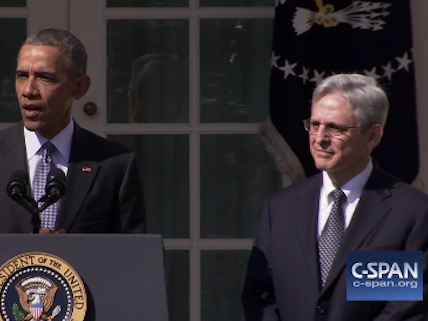Merrick Garland on Citizens United, the First Amendment, and Campaign Finance Regulation
Examining SCOTUS nominee Merrick Garland's vote in SpeechNow.org v. FEC

In 2010 the U.S. Court of Appeals for the District of Columbia Circuit issued a unanimous en banc opinion in the case of SpeechNow.org v. Federal Election Commission. At issue was the constitutionality of federal campaign finance regulations controlling the actions of independent groups that expressly advocate for and against political candidates. David Keating, the president of SpeechNow.org, a nonprofit, argued that the First Amendment prevented Congress from forcing his group to go through the costly and burdensome process of registering as a "political committee." Keating also maintained that the First Amendment barred Congress from prohibiting individuals from contributing more than $5,000 to groups like his.
The D.C. Circuit upheld the registration requirements. However, in a notable First Amendment victory, the D.C. Circuit struck down the contribution limits. Why? "Because of the Supreme Court's recent decision in Citizens United v. FEC, the analysis is straightforward," the D.C. Circuit wrote. According to Citizens United, "independent expenditures do not corrupt or give the appearance of corruption as a matter of law." That means "the government can have no anti-corruption interest in limiting contributions to independent expenditure-only organizations," the D.C. Circuit observed. "No matter which standard of review governs contribution limits, the limits on contributions to SpeechNow cannot stand."
Notably, the D.C. Circuit rejected the FEC's attempt to distinguish Citizens United, which struck down an expenditure limit, from the SpeechNow case, which dealt with a contribution limit. In other words, the D.C. Circuit had an opportunity to accept the federal government's narrowing analysis of Citizens United and it rejected that narrowing analysis. Among the judges who joined the D.C. Circuit's opinion in SpeechNow.org v. FEC was Merrick Garland, who is now President Obama's nominee to replace Justice Antonin Scalia on the U.S. Supreme Court.
Earlier today I wrote that Garland's record in criminal justice and wartime government powers cases may "come as a disappointment to many progressives." Garland's vote in SpeechNow may also come as something of a disappointment to his would-be progressive supporters.


Show Comments (39)